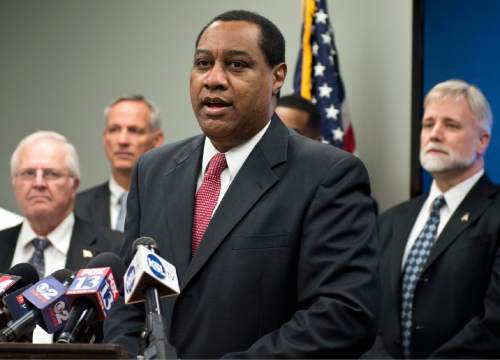This is an archived article that was published on sltrib.com in 2016, and information in the article may be outdated. It is provided only for personal research purposes and may not be reprinted.
The Utah Republican Party's first foray into online voting in Tuesday's presidential caucus was not without snags, with voters stymied by long waits and confused by the registration process.
Utah Republican Party Chairman James Evans said about 90 percent of the calls from people having problems with the online voting system were from people who thought they had registered to vote online, but either couldn't be approved because their membership in the party couldn't be verified or they had misplaced the personal identification number (PIN) that was emailed to them.
Evans said about 40,000 applied to vote online but 10,000 of those were rejected because their records couldn't be verified. Many didn't realize they had been denied until they tried to vote Tuesday.
"Primarily it was people thinking they were approved to vote online [but were not]," Evans said. "The other category were people who received their PIN and it went to their spam folder or they just deleted it."
The support line for the online voting was bogged down with calls from confused voters — both those having problems voting and others who hoped to be able to register Tuesday, although the pre-registration deadline had already passed. It meant long, frustrating waits for some voters.
Marie Nuccitelli, the Republican precinct chairwoman in Lehi's 16th precinct, said she had three people contact her Tuesday because of problems with online voting. Two of those involved PIN numbers that were either overlooked or not sent.
The third, she said, involved a woman in her 80s who had been a Republican voter and donor her whole life, but the system said could not vote online because her membership in the party could not be verified.
The woman signed up to vote online because she is too frail to attend her caucus, Nuccitelli said.
She was being given an absentee ballot that she could cast as a provisional vote.
Also on Tuesday, the group Common Cause questioned the security precautions in place for the GOP's online voting system, warning that computer viruses could run in the system and change people's intended votes so they could ultimately be tallied for another candidate.
"So a lot of Utahans (sic) will FEEL like they voted for a particular candidate. But there is no way for them to KNOW if their votes were recorded correctly, or for the results to be audited to confirm that votes were recorded as cast," wrote Susannah Goodman, a voting and elections specialist with Common Cause.
Evans said voters are able to go into the system with their PIN and check to make sure their votes are counted accurately after they are cast.
"We're looking at what is probable, not what is hypothetical and the fact that each voter can verify for themselves who they voted for, we felt comfortable," Evans said.
Goodman said the flaw in that logic is it again relies on the computer for the verification and there is no way for voters to know for sure if the verification is authentic.
Overall, Evans said there has been "huge" participation in the online voting and he is pleased with the results.
"The overall assessment is, I think, that it has been a breakthrough," he said. "It's certainly been exciting and we're learning a lot from this process."



